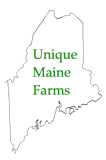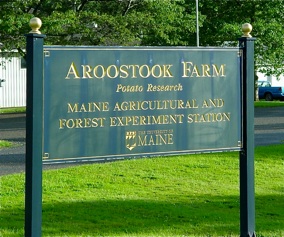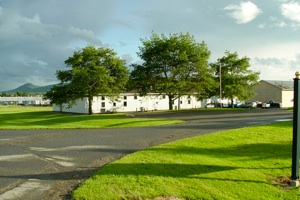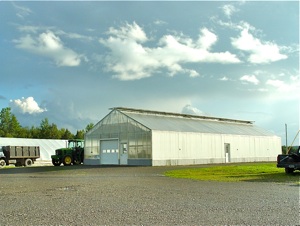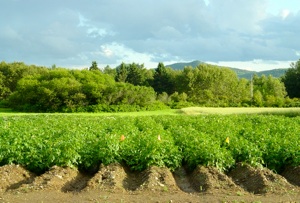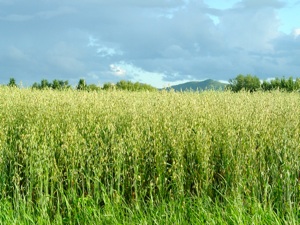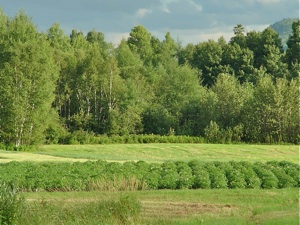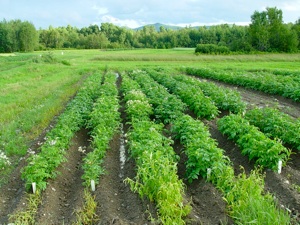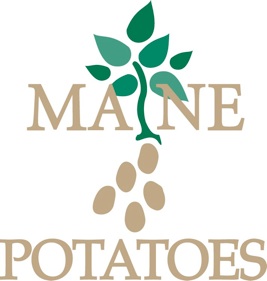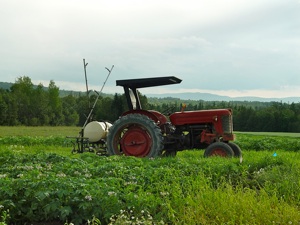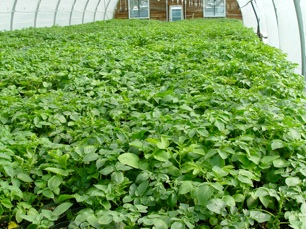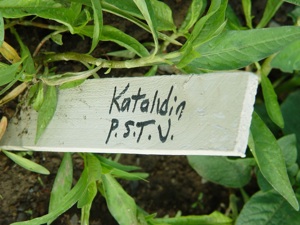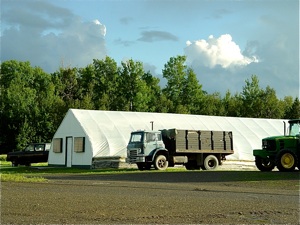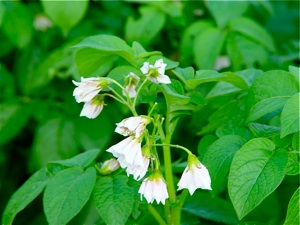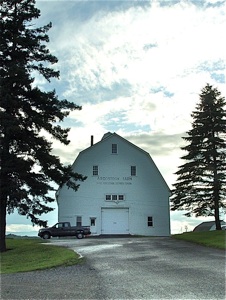Name: Aroostook Farm
Address: Randy Smith
Aroostook Farm
59 Houlton Road
Presque Isle, Maine 04769
Phone: 207-762-8281
Fax: 207-764-6740
Email: randy.smith@maine.edu
Website:
Products and Services:
-agricultural research facility
-development for Maine’s potato industry
-four labs
-potato storage research facility
-year-round 2800 sq. ft. greenhouse
-development of new potato varieties
-creation of new potato virus detection
methods
-investigation of techniques to reduce
dependence on chemical insecticides
-designing sustainable management
systems
-testing of potatoes for disease and sugar
content
-Spudlines newsletter
-annual potato conference
-home of UMaine Cooperative Extension
office
What Makes Aroostook Farm Unique?
Anyone familiar with the Great Famine in Ireland that occurred in the 1840‘s can understand how potato blight can result in devastating loss. At the time of the Irish famine, potatoes were the primary staple crop of which the Irish people depended for their sustenance. For many years the production of potatoes has been the predominant agricultural crop in Aroostook County. Fortunately, the potato farmers in Maine have had the ability to learn a great deal from the scientists and researchers associated with Aroostook Farm in Presque Isle about potato blight and the other many challenges that arise in growing potatoes.
Aroostook Farm is the second research facility in the University of Maine system to be included in the Unique Maine Farms’ project. Highmoor Farm in Monmouth, whose profile is also included in this project, was originally purchased by the state of Maine in 1909, as a research facility to primarily study apple production. Farmers in the Aroostook area were interested in having a local farm where the production of potatoes could be studied. Greenwood Farm, a 275 acre farm near Presque Isle, was purchased in 1915, by a committee of farmers with the assistance of an appropriation from the Maine Legislature. The University of Maine and the United States Department of Agriculture established research and outreach programs at the farm. When the adjacent Annis Farm was up for sale in 1939, it was purchased and the newly-expanded Aroostook Farm was established.
There are five experimental farms in the University of Maine’s system. Aroostook Farm, with its 425 acres, is the largest of these farms. The facility is quite impressive. There are four labs in the lab/office building, a large barn, two greenhouses, a state-of-the-art potato storage research building, a workshop, two machine storage buildings, and the home of the farm superintendent.
A great deal of collaborative work takes place at Aroostook Farm. The farm is not only home to the scientists and researchers from the University of Maine. There is a Cooperative Extension office at the farm that is jointly funded by both the University of Maine and the state. They host a potato pest-scouting program. They also publish the Spudlines newsletter and sponsor the annual potato conference.
The USDA-ARS New England Plant, Soil, and Water Laboratory undergoes research at Aroostook Farm on the three-year crop rotation of potatoes with soybeans, canola, sweet corn, green beans, and barley/clover. The USDA conducts plant breeding operations and monitors demonstration plots at Aroostook Farm.
Randy Smith, the Farm Superintendent at Aroostook Farm, proved very welcoming and
knowledgeable when Unique Maine Farms visited this past August. He discussed how three faculty members, who teach at the Orono campus of the University of Maine, conduct research on potatoes at the farm, along with several graduate students. A pathologist is also studying grain production. The Aroostook area offers prime conditions for growing seed potatoes and Smith described how there has been a long history associated with them. The very cold winters have a sanitizing affect on the soil.
Eighty acres have been rented from Gartley Farm in Presque Isle to support the plant breeding effort that takes place. Developing different varieties of potatoes at Aroostook Farm was funded for twenty-seven years by the Maine Potato Board until 1996. The federal government has continued to support the program through grants. Fourteen different varieties of potatoes have been introduced at Aroostook Farm. These new varieties include: Delta Gold, Allagash Russet, Yankee Chipper, Yankee Supreme, Islander, Sunrise, Campbell 14, Somerset, MaineChip, Prestile, Portage, Mainestay, St. John’s, and Quaggy Joe.
Conventional and organic methods of growing crops are implemented at Aroostook Farm. In the past the focus was on the yields that could be garnered from the crop. The focus now has moved towards studying whether a certain variety might be good for breeding stock and if it will be more resistant to disease and pests.
Smith commented that the organic food markets have expanded along with an interest in organic gourmet potato varieties. A great deal of work is taking place in developing new potato varieties at Aroostook Farm, but the process is very labor intensive and time consuming. The process takes eight years of tests and scrutiny. In the greenhouses there were over 80,000 young potato plants. Every seedling is distinctive. About one in 100,000 seedlings will pass muster for becoming a new variety. According to the pamphlet, Potatoes in Northern Maine, by Alvin Reeves, Kevin McCartney, and Alfred Bushway, “Only one in every thirty to thirty-five named varieties is ever used in commercial production.”
Having owned a potato farm, Randy Smith is very cognizant of the various trends in the market and the need for farmers to be able to introduce successful Integrated Pest Management practices. At Aroostook Farm, scientists and researchers are studying the molecular genetics of potato pathogens. There are many efforts to develop faster methods to uncover potato viruses in seed stock. Potato varieties that are more disease resistant are being developed.
In any type of agricultural production, attention to the soil fertility and crop rotation is paramount. These concerns are being addressed at Aroostook Farm. Various soil amendments are evaluated. Green manures are incorporated. The farm is the site of a long-term potato ecosystem study.
Farmers growing potatoes successfully on a commercial level have often relied on the resources provided by Aroostook Farm. There is a collection of diseased potato tubers for teaching and identification. The scientists and researchers at the facility have extensively studied the viruses, diseases, and the assortment of pests that can wreak havoc on a potato field. Aroostook Farm has consciously attempted to control pests with as little chemical insecticides as possible. Fungicides are sprayed regularly on the potato plants to prevent various blights and diseases.
So many factors can affect the success of a potato crop. Excessive rain and drought can result in dramatically reduced yields. Fungi and insects that can destroy the potato plant include early blight, late blight, the Colorado potato beetle, the green peach aphid, the potato aphid, and verticillium wilt. The viruses that can weaken the potato plant are leafroll, Y, and Z. These viruses will prevent a seed grower from being able to have their seed certified for sale. Tuber diseases include scab, rhizoctonia, silver scurf, and wireworms. Bacterial and fungal diseases include bacterial ring rot, blackleg, Fusarium, soft rot, and water rot.
All the challenges to growing potatoes that have been shared above truly seem somewhat overwhelming. A great deal of credit goes to all the commercial potato farmers who have persevered despite the many obstacles along the way. It is unsettling to have to compete with other potato-producing states with very large commercial farms with established markets. Fortunately the potato farmers in Aroostook County have some very helpful resources - the Maine Potato Board, the Maine Cooperative Extension, the United States Department of Agriculture, and the innovative research and development taking place at Aroostook Farm in Presque Isle.


